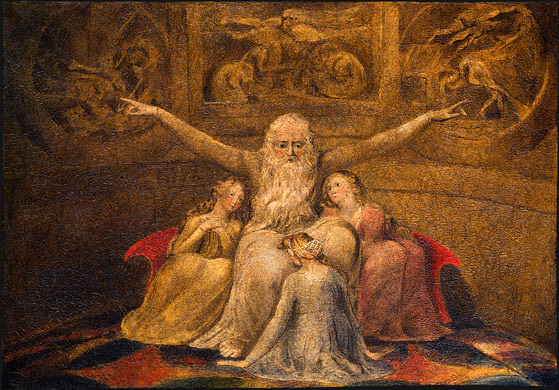
Blake's Job and His Daughters, 1800
Lecture 15. January 27, 1948
THE BOOK OF JOB
The whole meaning of this book is complicated. It is completely a work of literary art, and affords the guarantee that, for the Bible, the use of the poetic imagination is legitimate and essential. It is akin to literary forms we meet elsewhere. The original of epics and sagas are all there in the Bible, but they have been incorporated into something else. Only the forms that are on the more remote side, such as letters, memoirs, have continued as definite forms.
Job seems unconnected with anything else in the Bible, except in tone. It was probably subject to an editing process. But the editing, as well as the writing, is inspired. It is a fairly late book.
Shakespeare’s comedies start out as light, urbane, sophisticated romance, like Twelfth Night, which has a lilt to it, and we enter into a carnival world where frustrations have disappeared. The later comedies have elements which disrupt the feeling of pleasantness. The Merchant of Venice is practically a tragedy. Shylock disturbs us, and the metallic quality of the imagery effects the whole tone. Then his comedy digs more deeply into the tragedy of life. The sense of escape, of the fairy world, fades out. All’s Well That Ends Well has an ironic title. Falstaff is an ambiguous character; he is not a figure of fun; the tragic and the comic are rooted in him. The Winter’s Tale and The Tempest have serenity and repose.
Job is a tough piece of work. The last chapter has the feeling of comic resolution—he has got everything back. Yet it isn’t resolution. If you lose something, you don’t get it back. The notion that Job could be restored doesn’t work.
WHY DO THE INNOCENT SUFFER?
The heart of the book is a discussion as why the innocent suffer. The three comforters are not fools; they are trying to help, to bring balance and reason into his mind through Jewish law. They are people of human sympathy, conventional people as in Greek tragic chorus, the voice of common sense. Job doesn’t make a much better show than they do. The sense that Job is a tragedy is because of the dialogue concerning the suffering of the innocent, which is the theme of all tragedy.
It is tormenting to anyone but the reader who has read the prologue. We cannot forget that “way up in the gods” are God and Satan betting on Job. The one argument that newer occurs to the comforters is that God wants to settle a bet. They assume that Job is suffering because he has done wrong. We know it is because he has done right. Job is happy and prosperous because he is attached to God. Man fell because he detached himself from God. Here, God withdraws from Man, a paradox.
Job and his friends take part in a dialogue. The author is trying to fish something out of tragedy, to establish the point of tragedy. The point of Job is “why do the innocent suffer?” This is the same question as in Lear in Cordelia’s death. The tragic flaw as a moral judgment is not a tragic flaw at all. In Milton, the flaw in Adam is that he is a creature of free will. But Adam’s flaw does not infer a moral judgment on God.
Job says, I have done nothing to deserve this. The flaw is that he exists. The flaw, therefore, seems to be in the God that made him. Yet, a moral judgment on God is irrelevant.
